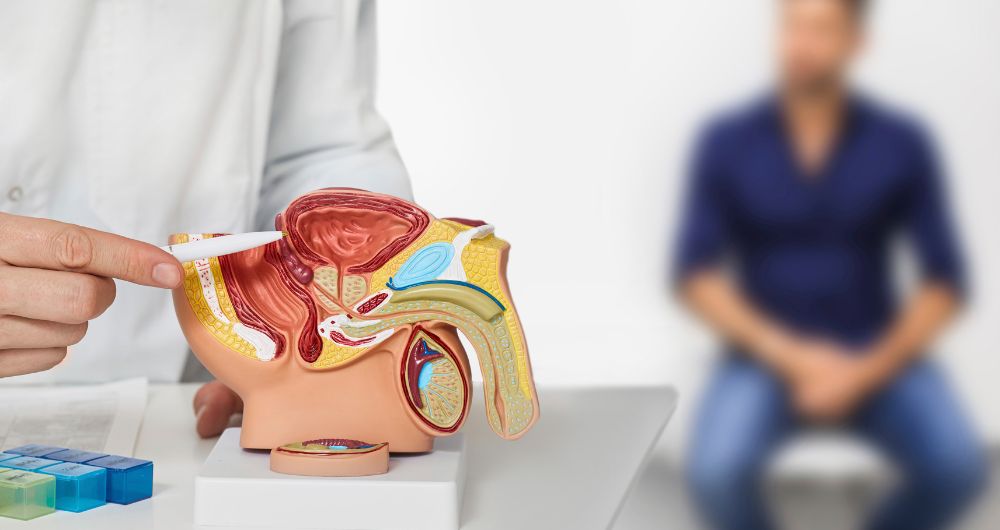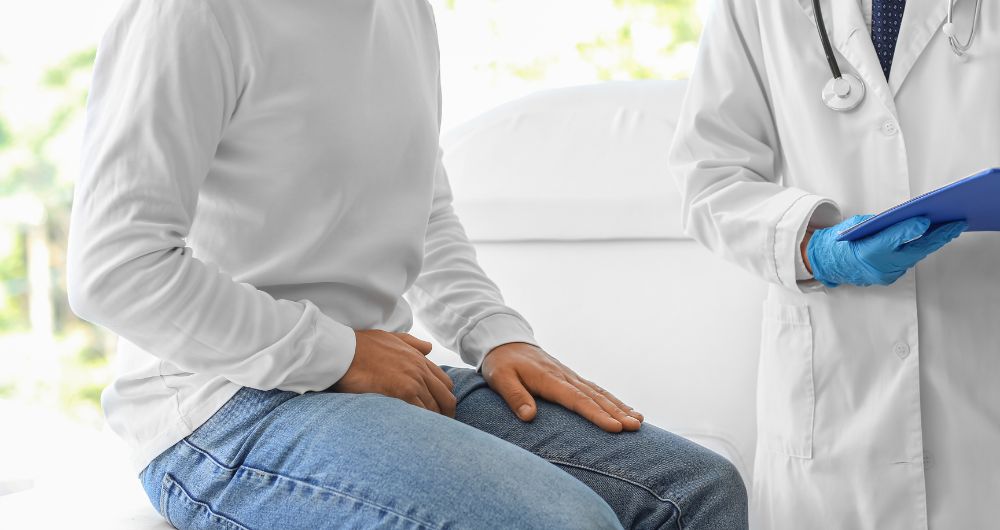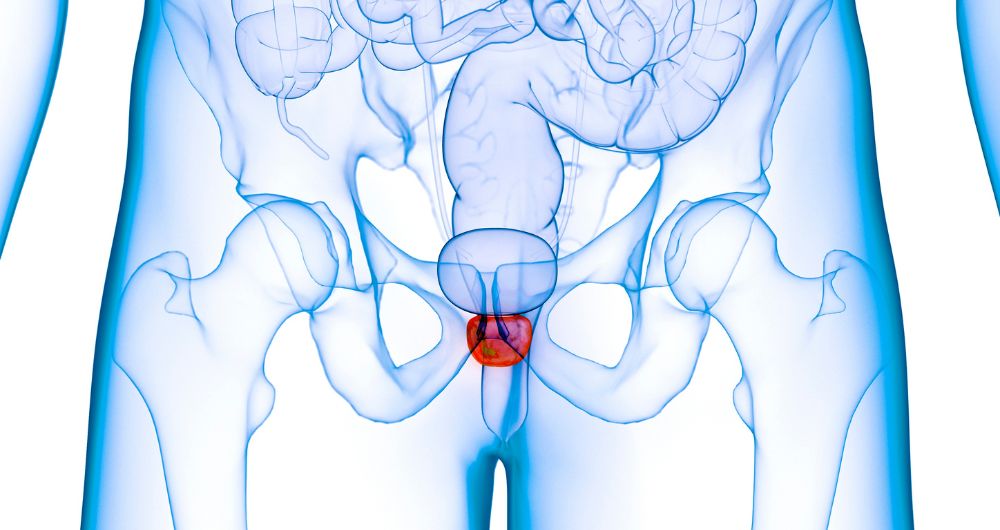
✔ Prostatitis is a condition characterized by inflammation of the prostate gland, often causing pelvic pain, urinary symptoms, and discomfort during urination or ejaculation.
✔ Various factors, including bacterial infections and lifestyle habits, contribute to the development of prostatitis.
✔ Treatment for prostatitis involves a multifaceted approach including antibiotics for bacterial infections, anti-inflammatory medications, lifestyle modifications, and consultation with a primary care doctor in Southington, CT, to address symptoms effectively.
✔ When seeking a primary care doctor in Southington, CT, for prostatitis management, consider factors such as credentials, specialized experience, communication style, and patient-centered care to ensure optimal treatment and support.
Prostatitis is a condition that affects the prostate gland, causing inflammation and discomfort. It can manifest in various forms and can be caused by various factors. To shed light on this often misunderstood condition, here are insights into the causes of prostatitis from a primary care doctor in Southington, CT:

Understanding these causes is crucial for effective management and treatment. Consulting with a primary care doctor in Southington, CT, is advisable for more detailed information and personalized care.
Bacterial infection is one of the primary causes of prostatitis, as emphasized by primary care doctors in Southington, CT. Bacteria can infiltrate the prostate gland via various routes, including urinary tract infections or sexually transmitted infections. When bacteria proliferate within the prostate, inflammation occurs, giving rise to the characteristic symptoms of prostatitis.
The symptoms can vary in severity and may include:
Individuals with bacterial prostatitis often experience pain or discomfort in the pelvic area, lower abdomen, or lower back. This pain may be dull, aching, or sharp and may worsen during bowel movements or urination.
Urinary symptoms are common in bacterial prostatitis and may include:
Bacterial prostatitis can also affect sexual function, leading to symptoms such as:
Flu–Like symptoms
In some cases, bacterial prostatitis may cause systemic symptoms similar to those of the flu, including:
Blood in Semen or Urine
Hematospermia (blood in semen) or hematuria (blood in urine) may occur in bacterial prostatitis, although it’s less common than other symptoms.
During a digital rectal examination (DRE), a healthcare provider may detect prostate gland tenderness, swelling, or enlargement.
Surprisingly, not all cases of prostatitis are caused by bacterial infections. Non-bacterial prostatitis, also known as chronic pelvic pain syndrome, is more common than its bacterial counterpart. The exact cause of nonbacterial prostatitis is not fully understood, but it may involve factors such as inflammation, nerve damage, or muscle dysfunction in the pelvic region. Consulting a primary care doctor in Southington, CT, can shed light on personalized approaches to managing this condition.
Here are the common symptoms associated with prostatitis, including non-bacterial prostatitis:
Stress has been linked to prostatitis pain. Psychological stress can trigger or exacerbate inflammation in the body, including the prostate gland. Chronic stress may weaken the immune system and exacerbate pelvic muscle tension, leading to prostatitis symptoms. Seeking guidance from a trusted primary care doctor in Southington, CT is crucial for effectively managing stress-related health concerns like prostatitis.
Combating psychological stress with the help of primary care doctors in Southington, CT, is crucial for overall well-being, including managing conditions like prostatitis. Here are five relaxation techniques that can help individuals cope with stress:
Deep breathing techniques can help activate the body’s relaxation response, reducing stress and promoting a sense of calm. One effective method is diaphragmatic breathing, where you focus on breathing deeply into your abdomen rather than shallowly into your chest.
PMR is a technique that involves systematically tensing and relaxing different muscle groups in the body to release tension and promote relaxation.
Guided imagery involves visualizing calming and peaceful scenes or experiences to evoke a sense of relaxation and well-being.
Yoga combines physical postures, breathing techniques, and mindfulness to promote relaxation and reduce stress. Practicing yoga regularly can help release tension from the body and calm the mind. Similarly, gentle stretching exercises can help alleviate muscle tension and promote relaxation. Consider incorporating yoga or stretching into your daily routine to help combat psychological stress and promote overall well-being.
According to primary care doctors in Southington, CT, certain lifestyle factors can increase the risk of developing prostatitis or exacerbate existing symptoms. These include prolonged sitting, sedentary behavior, excessive alcohol consumption, and inadequate fluid intake. Poor lifestyle habits can compromise urinary function and contribute to pelvic congestion, predisposing individuals to prostatitis.
Dietary habits can also play a significant role in managing prostatitis symptoms. Certain foods and beverages may aggravate inflammation or irritate the prostate gland, leading to increased discomfort or exacerbation of symptoms.
Here are some dietary habits that individuals with prostatitis may want to avoid or limit:
Spicy foods, such as chili peppers, hot sauces, and spicy curries, can irritate the bladder and exacerbate urinary symptoms in individuals with prostatitis.
Acidic foods and beverages, including citrus fruits, tomatoes, and acidic juices like orange juice, may irritate the urinary tract and worsen symptoms of prostatitis.
Caffeine found in coffee, tea, energy drinks, and some sodas can act as a diuretic, increasing urinary frequency and urgency, which may aggravate symptoms of prostatitis.
Carbonated beverages, such as sodas and sparkling water, can irritate the bladder and exacerbate urinary symptoms in some individuals with prostatitis.
Some artificial sweeteners, such as aspartame and saccharin, have been associated with bladder irritation and increased urinary frequency in some individuals. Avoiding or limiting foods and beverages containing these sweeteners may help manage symptoms.
Highly processed foods, including fast food, packaged snacks, and sugary treats, may contribute to inflammation in the body and worsen symptoms of prostatitis. Opting for whole, unprocessed foods can help reduce inflammation and support overall health.
High-fat and fried foods, such as fried meats, fast food, and processed snacks, may contribute to inflammation in the body. Choosing lean proteins, healthy fats, and cooking methods like baking, grilling, or steaming can benefit individuals with prostatitis.
Some individuals with prostatitis may find that dairy products, particularly those high in fat, exacerbate their symptoms. Experimenting with dairy alternatives or choosing low-fat dairy options may help alleviate discomfort.

Effective treatment for prostatitis requires a comprehensive approach tailored to each individual’s needs. To provide valuable insights into managing this condition, we consulted a primary care doctor in Southington, CT, who shares expert advice on prostatitis treatment options.
Antibiotics are the cornerstone of treatment for bacterial prostatitis. The prescribed antibiotic will depend on the type of bacteria causing the infection and its sensitivity to different antibiotics. It’s crucial to complete the full course of antibiotics as your healthcare provider prescribes to ensure the infection is fully eradicated.
In cases of non-bacterial prostatitis or chronic pelvic pain syndrome (CPPS), anti-inflammatory medications may be prescribed to help reduce inflammation and alleviate symptoms. Nonsteroidal anti-inflammatory drugs (NSAIDs) or other pain relievers may be recommended to manage pelvic pain and discomfort.
Alpha-blockers are medications that help relax the prostate and bladder neck muscles, improve urinary flow, and reduce urinary symptoms such as urgency and frequency. These medications may be prescribed for individuals with prostatitis-related urinary symptoms.
Pelvic floor physical therapy can benefit individuals with prostatitis, particularly those with pelvic pain or muscle tension. Physical therapists specialized in pelvic floor rehabilitation can teach techniques to relax and strengthen the pelvic floor muscles, reducing pain and improving urinary function.
Making lifestyle changes can help manage prostatitis symptoms and improve overall health. This may include:
Dealing with chronic pain and discomfort associated with prostatitis can take a toll on mental health. Seeking support from a mental health professional, such as a therapist or counselor, can help individuals cope with stress, anxiety, or depression related to their condition.
Regular follow-up appointments with your healthcare provider are essential to monitor your progress and adjust treatment as needed. It’s important to communicate any changes in symptoms or concerns to ensure you receive appropriate care.
Selecting the most suitable primary care doctor in Southington, CT, is a critical step in effectively managing prostatitis. Prostatitis, a condition characterized by inflammation of the prostate gland, requires comprehensive care and expertise. Here’s how you can find the right primary care doctor in Southington, CT, who can address your prostatitis needs with proficiency and compassion.
Begin your search for a primary care doctor in Southington, CT, by seeking recommendations from trusted sources such as friends, family members, or colleagues. Their firsthand experiences can provide valuable insights into potential healthcare providers’ quality of care and professionalism.
Ensure that the primary care doctor in Southington, CT, you consider is board-certified and holds the necessary qualifications and credentials to diagnose and treat prostatitis effectively. Look for evidence of specialized training or experience in urological conditions to ensure expertise in managing prostatitis.
Utilize online resources to conduct thorough research on primary care doctors in Southington, CT. Explore official websites, review platforms, and healthcare directories to gather information about their background, areas of expertise, patient reviews, and testimonials.
Look for a primary care doctor in Southington, CT, who has experience diagnosing and treating prostatitis or other urological conditions. Specialized experience can contribute to accurate diagnoses, tailored treatment plans, and better outcomes for prostatitis patients.
Choose a primary care doctor in Southington, CT, who demonstrates excellent communication skills, actively listens to your concerns, and involves you in the decision-making process regarding your healthcare. Prioritize providers who prioritize patient-centered care and treat you with empathy, respect, and dignity.
Take into account the location and accessibility of the primary care doctor in Southington, CT. Opt for a healthcare provider whose office is conveniently located and offers accessible appointment times to accommodate your schedule.
Pay attention to the atmosphere and office of the primary care doctor in Southington, CT. A welcoming, clean, and organized office environment can contribute to a positive healthcare experience and foster a sense of comfort and trust.
Confirm whether the primary care doctor in Southington, CT, accepts your health insurance plan and is in-network with your insurer. Understanding insurance coverage in advance can help you avoid unexpected out-of-pocket expenses and ensure affordable access to care.
Choose a primary care doctor in Southington, CT, who offers accessible appointment times and timely access to care for both routine visits and urgent concerns related to prostatitis or other health issues.
Prioritize primary care doctors in Southington, CT, who take a holistic approach to healthcare, addressing the physical aspects of prostatitis and the psychological, emotional, and social factors that may impact your well-being. Establishing a long-term relationship with a trusted primary care doctor in Southington, CT, can ensure continuity of care and ongoing support for managing prostatitis effectively.

Prostatitis is diagnosed based on a combination of symptoms, medical history, physical examination, and diagnostic tests such as urine analysis and the prostate-specific antigen (PSA) test. Further diagnostics may include prostate massage and culture, along with imaging studies.
Prostatitis itself is not contagious, but if it is caused by a bacterial infection, it may be transmitted through sexual contact or exposure to infected bodily fluids.
It’s important to see a doctor if you experience symptoms suggestive of prostatitis, such as pelvic pain, urinary symptoms, or discomfort during urination or ejaculation. Early diagnosis and treatment can help prevent complications and improve outcomes.
Acute prostatitis usually develops rapidly, while chronic prostatitis persists for three months or longer. Chronic nonbacterial prostatitis refers to ongoing prostate irritation not attributed to bacterial infection.
Extensive cohort studies indicate that frequent ejaculation is linked to a heightened risk of prostatitis, particularly among younger males. Furthermore, substantial evidence from sports medicine research suggests that vigorous muscular contractions can result in localized elevation of free radicals and lactic acid production.
Struggling with prostatitis and seeking answers? Look no further than Docs Primary Care – Southington, where our experienced primary care doctors are here to help. From diagnosis to personalized treatment plans, we’re dedicated to providing comprehensive care to help you find relief and regain your quality of life. Don’t let prostatitis hold you back any longer – schedule an appointment with Docs Primary Care – Southington today and take the first step towards wellness.



During this surge in COVID-19 cases, our primary focus is meeting the high demand for tests, and we are seeing higher than usual wait times. This means we are unable to answer most phone calls. Please know that our teams are working very hard during this time to care for as many patients as safely as possible. Please click the button below for answers to common questions. We appreciate your understanding.